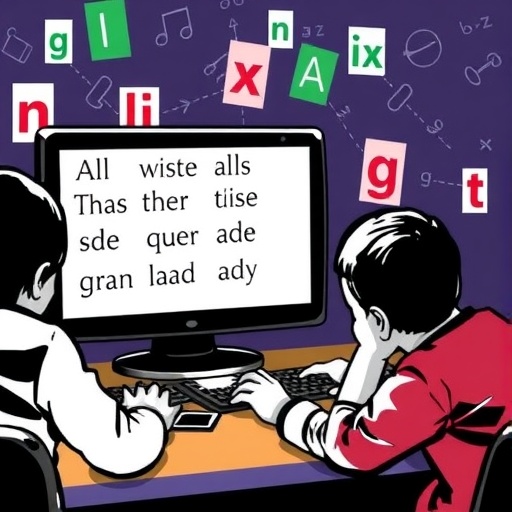Recent advancements in educational technology have sparked a transformative shift in how young learners acquire foundational skills such as spelling. The promising intersection of gaming and education has opened up new pathways for cognitive development, particularly in mastering language. A compelling study conducted by Taati Jeliseh and I. Xodabande sheds light on the efficacy of individual versus collaborative educational games in enhancing English spelling skills among young learners. This research, published in the journal Discover Education, engages with a critical inquiry into pedagogical methods that address the diverse learning needs of children.
Spelling is a fundamental component of literacy, acting as a building block for effective communication. Young learners often face challenges in this area, which can affect their overall educational trajectory. The study highlights the necessity of innovative teaching approaches in addressing these difficulties. By integrating educational games into the curriculum, educators can create an engaging learning environment that promotes active participation and motivation, essential elements for sustaining a child’s interest in language acquisition.
The researchers utilized a methodical approach to assess the outcomes of educational games. Participants in the study were divided into two distinct groups: those who engaged in individual gaming experiences and those who collaborated with peers to navigate challenges presented in educational games. This dual approach allowed the research team to evaluate both the individual and social dimensions of learning, offering valuable insights into the most effective strategies for improving spelling proficiency.
One noteworthy finding of the study was the marked difference in spelling performance between the two groups. Children who engaged in collaborative educational games showed significant improvement compared to those who worked alone. This indicates that social interaction, combined with competitive elements inherent in gaming, can stimulate learning and retention in a way that solitary study often cannot achieve. The collaborative setting not only fosters communication but also encourages peer learning, where students can share strategies and correct each other’s mistakes in a safe environment.
Moreover, the research underscores the role of interactive learning. The games used in the study were designed to be engaging, with vibrant graphics and compelling narratives that drew students in. This level of engagement is crucial in the early stages of learning, as it helps to build intrinsic motivation. Children are more likely to invest time and effort into learning activities that they find enjoyable, which is a striking advantage of educational games compared to traditional rote learning.
The study further explores how different types of gameplay can create varied learning outcomes. The researchers identified that games that included elements of competition led to a heightened motivation among participants. The thrill of competition, whether against peers or within a digital framework, appears to bolster children’s drive to improve their skills. This phenomenon aligns with established theories in educational psychology, where competition can be a powerful motivator for achievement.
Conversely, the researchers also acknowledged some limitations of the competitive landscape. While competition can ignite enthusiasm, it may also induce anxiety in certain children. To mitigate these effects, it is paramount that educators carefully consider the dynamics of group interactions and the individual personalities of learners. The study advocates for a balanced approach, suggesting that the incorporation of collaborative activities alongside competitive ones may yield the best overall results in fostering spelling skills.
Additionally, the research draws attention to the importance of formative assessment within game-based learning. Continuous feedback mechanisms, such as instant performance tracking in educational games, empower students to recognize their progress and areas needing improvement. This immediate feedback loop allows learners to adjust their strategies quickly, which is a significant advantage over traditional testing methodologies that may delay acknowledgment of a child’s grasp on the material.
As the findings of this research permeate the educational landscape, educators and policy-makers are encouraged to rethink conventional pedagogical practices. The potential of educational games extends beyond mere spelling skills; they can cultivate critical thinking, teamwork, and problem-solving abilities. As educators embrace this innovative approach, it becomes crucial to integrate game-based learning into the broader curriculum, ensuring that it complements existing educational frameworks.
In summary, the study conducted by Taati Jeliseh and I. Xodabande provides compelling evidence for the effectiveness of educational games in enhancing spelling skills among young learners. By analyzing both individual and collaborative gameplay experiences, the researchers illuminate the pathways through which engagement, interaction, and competition can substantially influence learning outcomes. This research invites a wave of change in educational methodologies that could redefine how children learn in the 21st century.
As educational institutions increasingly prioritize innovative approaches, the practical implications of this research could be transformative. A future where educational environments are enriched with interactive gaming experiences may not only enhance academic performance but also foster a lifelong love for learning. Ultimately, investing in such pedagogical strategies could pave the way for a generation of learners who are more equipped to excel in an ever-evolving world.
Educational technology continues to evolve, and as evidenced by this study, harnessing the power of gaming in education is no longer a distant possibility but a tangible reality. With ongoing research and development in this field, the promise of sharper spelling skills amongst young learners may just be the beginning of a broader educational renaissance.
In conclusion, the integration of educational games in teaching spelling not only enhances linguistic abilities but also prepares young learners for future challenges. A collaborative learning environment supported by effective game design embraces the complexities of modern education, facilitating deeper connections, engagement, and ultimately, success in literacy.
Subject of Research: Impact of individual and collaborative educational games on English spelling skills among young learners.
Article Title: Assessing the impacts of individual and collaborative educational games on English spelling skills among young learners.
Article References:
Taati Jeliseh, M., Xodabande, I. Assessing the impacts of individual and collaborative educational games on english spelling skills among young learners.
Discov Educ 4, 306 (2025). https://doi.org/10.1007/s44217-025-00780-4
Image Credits: AI Generated
DOI: 10.1007/s44217-025-00780-4
Keywords: Educational games, spelling skills, collaborative learning, young learners, game-based learning.




